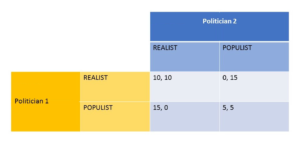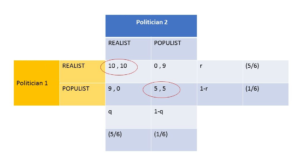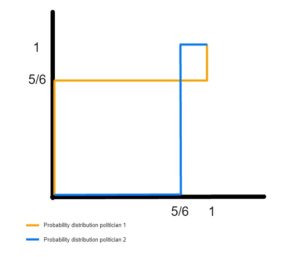Alessio Mitra is studying for an MSc in Applied Economics with Public Policy at the University of Bath’s Department of Economics
The state is usually seen as a benevolent actor, a public institution owned by all the citizens that works for them, and whose aim is to pursue their collective interest. It can also be argued that the welfare economic theory, a relevant part of the economic literature, shares this optimistic vision of public intervention. The state is conceived as a magnanimous maximiser of the collective utility function. We can imagine the collective utility function as the graphical representation of what the collective interests of society are – what is “best” for society.
Under this interpretation the state, making rational decisions, tries to fix what the economists call “market failures” and bring society to the best achievable result. A “market failure” happens when the free market does not make a “perfect” (maybe it would be better to say “optimal”) goods allocation. Thanks to the Economic Theory it is possible to detect when this is happening and, through public intervention, fix it.
It is easy to perceive how this vision presents the state primarily as a unique and compact agent, an agent that – prompted by external situations – attempts to act for the best. It is possible that its actions fail (or do not give the hoped results), but if this happens, it is a consequence of a lack of skill and not of purpose.
One of the first, and more relevant, economists that went beyond this simplistic (and somewhat naïve) vision is the Nobel Prize winner James Buchanan. He tried to analyse and understand how the state works from the inside. Instead of assuming a unified benevolent way of working, he decided to analyse how the actors that constitute the state make decisions, and how, these decisions only later become decisions of the state.
It is possible to support the necessity of this approach by interrogating as follows: if in the market we can have “market failure” due to free interaction between individuals, aren’t these individuals the same individuals who work in the state? Why would their behaviour change inside and outside of the state, in the public and private sphere? They are the same persons and they should follow the same logic. Why would they act selfishly in the market and as collective maximisers as soon as they hold a public office? For this reason, understanding how the state works becomes a fundamental topic if we want to justify and support public intervention.
The field of economic theory that takes this perspective is called “Public Choice”, and observes how politicians behave, following a rational and logical model, typical of the economic science.
Politicians are rational individuals like everyone else, and for this reason they are going to try to maximise their utility. Since a public office gives prestige, power, influence and economic benefits, it is likely that politicians will include these “goods” inside of their utility curve. The maximisation of their utility will include the possibility of being elected and re-elected.
The economist (and founder of modern political science) Anthony Downs said that politicians have to convince electors to vote for them. For this reason, they will present an election programme able to bring to them as many votes as possible. Following this logic, the best programme is the one that allows you to win the election, and not the best one for actual governmental reasons. Saying this does not mean that politicians will always behave selfishly, but that they will have to find a trade-off between rational self-interest and principles of ethics and morality.
It is possible to represent this situation as a “prisoner's dilemma”, that context when two players have the rational interest to not collaborate, even though cooperating would achieve a better result for all.
It is possible to imagine a “game” where two politicians can choose between a more populist election programme and a more realistic one. We define a realistic programme as a political programme that is coherent with the economic and policymaking constraints. A populist programme, on the other hand, we define as a programme that, in order to be more appealing to the electors, lies and does not take into account actual facts and budget constraints. (As an example, it is not possible to reduce taxation and at the same time increase welfare services without making debt; a proposal that contradicts this statement is populist). Both politicians will have, regardless of the choice of the other, a rational interest in choosing the populist programme. We therefore find a Nash equilibrium on “populist, populist”. Maybe the candidates would like to propose a different or more honest programme – but they have to consider that this decision is going to increase the possibility of victory for the other candidate.
Moreover, it can be argued that politicians will have an interest in increasing the capacity for public expenditure, since with a higher expenditure availability they will have more bargaining power with electors and stakeholders.
It is important to remember that personal ethics can always positively influence the strategic behaviour of politicians, but we cannot rely only on that – and to promote effective and useful public intervention it is fundamental to know the mechanisms that lie behind it. It is essential to try to build a structure which can incentivise, for rational reasons, more desirable behaviours in politics. (We are assuming here that a desirable behaviour is a non-populist one, as a non-populist behaviour is more likely to maximise social utility). An institutional structure able to incentivise desirable political behaviour not only for ethical reasons but also for rational self-interest is exemplified through good practice in the systematic use of pre-/post-implementation policy evaluation systems.
A structural policy evaluation system adds to the responsibilities of politicians in policy execution, enhancing the transparency of overall policy effectiveness. This can drastically influence the result of our game. The French government, for example, has recently moved in this direction; the newly-elected president Emanuel Macron has announced that no more public policy will be made in France without an evaluation of effectiveness both before and after implementation.
In light of this, how does our equilibrium change following the suggestion of Macron? Or more specifically, with the introduction of an independent structural policy evaluation system?
Taking inspiration from the Euler Equation, it is possible to express the marginal utility of express populist positions today as follow:
The equation represents the balance between present and future utility derived by present and future use of populism. Explained in other words, the marginal utility of taking a populist position in the current election and in the next one. 1+r is the socio-economic positive externality for being re-elected (staying in politics for a long time) and 1+Ѳ is the psychological impatience of being elected now.
In a context where we have clear political accountability, being populist at the first election is not always the best strategy. This is because it will decrease a player’s chance of being re-elected at the next election. Hence, politicians will try to find an optimal distribution of the amount of populism to use along the different elections, finding a balance – as suggested by the formula. If they know that – due to the policy evaluation system – being populist will decrease their possibility of being re-elected in the future, the utility they derive from taking a populist position today will decrease.
Now it is possible to run our game again. This time the payoff of being populist when the opponent is realist has been reduced from 15 to 9. This reduction is a result of the structural policy evaluation system.
This game does not have a unique pure Nash equilibrium any more, but two different ones. Even though there is the possibility of a “realist, realist” output, we do not have any information about which strategy the two players will use. For this reason, it is reasonable to find the mixed strategy Nash equilibrium.
A mixed strategy equilibrium is a probability distribution for each player, such that these distributions are mutual best responses to one another.
Computing the result, we find that both the politicians will choose the strategy “realist” with probability of 83% (5/6). This is a significant outcome, and one which shows how even a slight reduction in the utility of being populist can rationally push politicians towards more desirable behaviours. It is also important to point out that this specific numerical result is derived by the reduction of the pay-off that we have chosen. With a different pay-off, the result could also amount to a different number – but, accepting the game’s basic structure, the trend would remain the same. Thus, it would be possible to more formally express the new pay-off as 15 – e, where “e” is the penalty due to the introduction of the structural policy evaluation system. In the end, we would have a higher or lower impact on political behaviour depending on the efficiency and effectiveness of the policy evaluation system (the dimension of the “e” pay-off penalty).
The design of the evaluation system would need to acknowledge that the passive sharing of results with the public will not be enough, since it is easier to believe that a report which contradicts your beliefs is biased than to change your opinion; the system’s outputs would need to be shared widely and actively, with high standards of inclusion, transparency and independence. If such standards were met, however, the existence of a well-established policy evaluation culture could be expected to radically change the rational behaviour of politicians – and the resultant move away from populist policymaking caused by such a system might positively affect our economies and democracies.
References:
Buchanan, James M., Tullock, Gordon (1962). The Calculus of Consent: Logical Foundations of Constitutional Democracy.
Downs, Anthony (1957). An Economic Theory of Democracy. New York: Harper
Guido Tabellini, T. Nannicini, A. Stella, U. Troiano (2013) Social capital and political accountability. American Economic Journal.
Lee, Dwight R. (2012). Public Choice, Past and Present: The Legacy of James M Buchanan and Gordon Tullock. Springer Science & Business Media.
Mark Bovens, Paul ‘t Hart, Sanneke Kuipers (2009) The politics of Policy Evaluation. The Oxford Handbook of Public Policy.
Shaun Heap, Bruce Lyons, Martin Hollis, Robert Sugden, Albert Weale (1992). The Theory of Choice: A critical Guide. Wiley-Blackwell.
Respond








